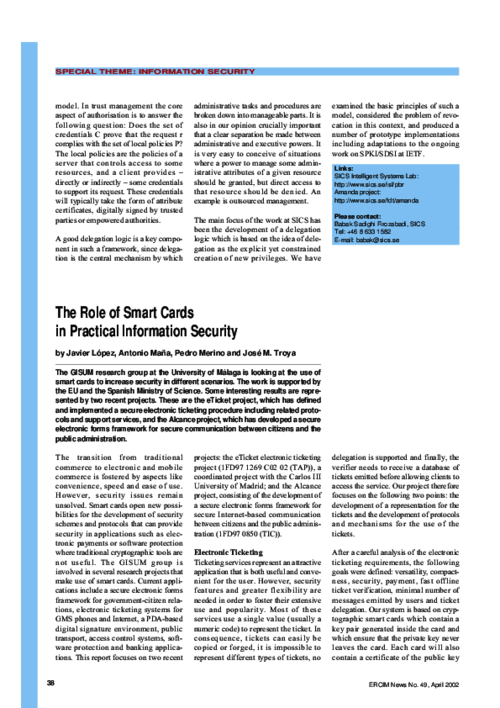 ] Title Type Year
] Title Type Year ERCIM News, vol. 49, pp. 38-40, 2002.
Abstract
The transition from traditional commerce to electronic and mobile commerce is fostered by aspects like convenience, speed and ease of use. However, security issues remain unsolved. Smart cards open new possibilities for the development of security schemes and protocols that can provide security in applications such as electronic payments or software protection where traditional cryptographic tools are not useful. The GISUM group is involved in several research projects that make use of smart cards. Current applications include a secure electronic forms framework for government-citizen relations, electronic ticketing systems for GMS phones and Internet, a PDA-based digital signature environment, public transport, access control systems, software protection and banking applications. This report focuses on two recent projects: the eTicket electronic ticketing project (1FD97 1269 C02 02 (TAP)), a coordinated project with the Carlos III University of Madrid; and the Alcance project, consisting of the development of a secure electronic forms framework for secure Internet-based communication between citizens and the public administration (1FD97 0850 (TIC)).

IEEE Transactions on Industrial Informatics, vol. 14, issue 8, IEEE, pp. 3745-3753, 08/2019, 2018. DOI
Abstract
The Smart Grid offers many benefits due to the bidirectional communication between the users and the utility company, which makes it possible to perform a fine-grain consumption metering. This can be used for Demand Response purposes with the generation and delivery of electricity in real time. It is essential to rapidly anticipate high peaks of demand or potential attacks, so as to avoid power outages and denial of service, while effectively supplying consumption areas. In this paper, we propose a novel architecture where cloud computing resources are leveraged (and tested in practice) to enable, on the one hand, the consumption prediction through time series forecasting, as well as load balancing to uniformly distribute the demand over a set of available generators. On the other and, it also allows the detection of connectivity losses and intrusions within the control network by using controllability concepts.
